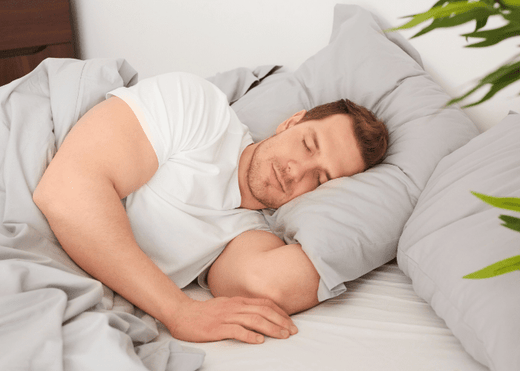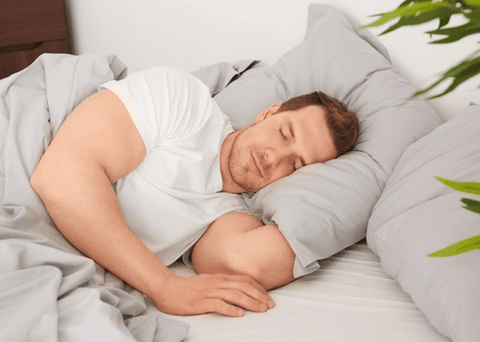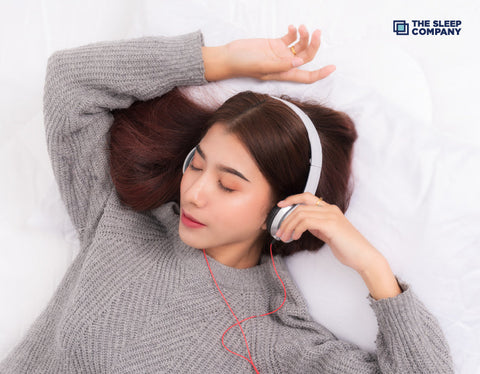My Cart

How to Get Yourself into a Healthy Sleep Routine


It is no secret that building a healthy routine can immensely help us in leading a healthy and happy life. It may sound easy at first, but, it can be quite challenging to stick to a balanced routine on a daily basis. Research has consistently shown that routines can play an important role in our mental health. Especially, In our fast-paced lifestyle, it is important to have a structured sleep routine for better health.
If you feel tired most of the time, then you should be given a thought to your sleep routine. Maintaining a healthy sleep routine can helps you beat fatigue, and improve overall health and sleep quality. We understand that it takes a certain motivation and discipline to stick to a healthy sleep routine. Here’s how you can get yourself into a healthy sleep routine to achieve your objectives.
Small Changes in your Sleep Patterns
Most people desire to sleep longer or more soundly. But improving your sleep patterns can do so much more for your health than just making you feel rested when you wake up. You may improve your mood, get your body ready for a taxing challenge, and feel more alert by getting up or going to bed earlier, taking a power nap, or getting lots of sleep. Here are some little adjustments you may make to your sleeping patterns that will have a major impact.
For a more upbeat perspective: Get up early

It appears that getting up early is truly advantageous. People are more genetically predisposed to rising early, according to studies. They might be less likely to experience depression due to a particular genetic component. Exposure to morning light helps your body produce mood-enhancing serotonin.
How can a night owl become an early bird?
Start by rising earlier to ensure that you experience sleepiness sooner in the evening (pressing the snooze button is not acceptable!). And as soon as you wake up, open the blinds or switch on some lamps. The light will increase your alertness by reducing your body’s production of the sleep-inducing hormone melatonin.
Fix Your Sleep Schedule

Sleeping less than the advised seven to eight hours a night is never a good idea, but if you know you won’t be able to for a few days perhaps due to a work project you might mitigate some of the negative consequences by “banking” additional snooze in advance. People who did this performed better on cognitive tests than those who completed the week of reduced sleep without having gotten more sleep. Researchers believe habitually obtaining more sleep could avoid the buildup of sleep.
Replace Your Mattress

You may be dozing off in your old, worn-out mattress, which may hurt your health in disguise. Your mattress must support your body uniformly while giving supreme comfort. If it doesn’t promote equal weight distribution, your lower back lacks sufficient support; your spine stays in a neutral position. Improper spinal alignment hosts many health issues over time, such as neck and backache. If you’re looking to replace your mattress, then buy mattress online and treat yourself to the best sleep.
Feel more energetic with a Power Nap

According to studies, with a 20-minute power nap in the middle of the afternoon can make you feel energetic, and alert and helps to improve your performance. Plan your nap for between 1 and 2 p.m., when your body clock is typically most sleepy, for the best energy boost. If you nap for more than 30 minutes, you risk disrupting your nocturnal sleep or developing sleep inertia, which causes you to wake up feeling drowsy.
Sleep on your back for better rest

Did you know? Even though only about 8% of individuals sleep on their backs, doing so is generally the healthiest option since it puts your head, neck, and spine in a neutral posture. It’s also excellent for preventing heartburn. It also lessens acid reflux and prevents back and neck problems. Additionally, because it keeps airways open, this posture will prevent snoring. The optimal sleep position is the one that’s most comfortable to you as your body will naturally move a number of times in the night whether you notice it or not. Most individuals find that lying on their stomach is uncomfortable, and doing so might make it difficult to breathe at night, causing them to wake up. Similar to lying on your stomach, lying on your back may be more comfortable for some people who are in discomfort, but it increases the likelihood of snoring and breathing problems at night. For most people, side sleeping is definitely the most restful position.
Unwind at least 30 minutes before bedtime

Ninety percent of individuals use some type of technology an hour before bed, which has a negative impact on your body’s internal clock, inhibits the release of the hormone melatonin, and makes it harder to fall asleep. According to studies, consistent nighttime exposure to artificial light increases the risk of breast cancer and has detrimental effects on cardiovascular health. There are two ways that technology interferes with sound sleep. First, the light may cause the brain to release a signal associated with the day, making it harder to fall asleep. Second, constant browsing and mental exercise can have negative mental health. Nobody is urging you to stop using technology. Just put away your laptop, tablet, phone, TV, and other electronics for at least 30 minutes before going to bed.






























































